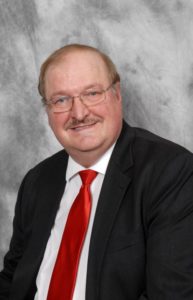
Longtime Saskatchewan Rivers board of education trustee Grant Gustafson has made the decision to not run in the upcoming election.
Gustafson announced his decision to the board at their regular meeting on Monday.
“I have done this for like 30 years already,” Gustafson said. “I would like to see new people get in and I know if I run again and get in, I’m probably stopping a new person, so I don’t want to do that. I want some renewal.”
Gustafson served as one of five urban trustees on the Sask. Rivers board. He said he still liked the role, but believed it was wrong to wait until he didn’t to stop running.
“I’ve got other priorities I’d like to be able to pursue, amongst them are a whole pile of grandchildren and you can’t put that on hold forever,” he said.
Gustafson served on Saskatchewan Rivers’ predecessor, the Prince Albert Public School Board. At that time, he served on the committee making recommendations on amalgamation
“Then I was off for about four years and when I came back on, it was the Sask Rivers board and then part way through that the second amalgamation which formed the second Sask Rivers board,” he remembered.
He also served on the Carlton board, which was separate, where he acted as a Prince Albert trustee.
Gustafson returned to the regular board in April, 2002 and has served on it ever since.
He worked with education directors Shirley Gange, William Cooke, Robert Bratvold and Neil Finch. Board chairs during his time on the board included Wayne Steen, George McHenry, Barry Hollick and Darlene Rowden.
By Gustafson’s count, he served with around 30 trustees in his time on all these boards.
One of his favourite aspects was seeing all the positive changes. He noted that schools are more hectic than ever but students and teachers each seem to be more engaged.
“It kind of contradicts all the extra things that we’re dealing with,” he explained. “There are a lot more struggles for kids in school these days, but we are managing to provide a lot more than we ever have, and hopefully someday we’ll be able to provide enough.”
Another positive from his time on the board has been the integration of cultures into schools, particularly First Nations and Metis culture. He said that aspect ties into the history of the Prince Albert area.
“We were so focused on delivering what was the Eurocentric education, and now that we’re embracing other cultures, including the Indigenous cultures, I think we’ve got a better overall program,” Gustafson said.
Gustafson believes that everyone benefits from new ideas like land-based learning because it pays attention to what other cultures bring into society.
“We had an Aboriginal advisory committee and then that actually disappeared with the first amalgamation, and we were looking at ways that we could engage and benefit from the Indigenous community,” he said.
Gustafson said that looking at and reacting to the 94 Calls to Action from the Truth and Reconciliation Commission has benefited the board. One example is the creation of the Elder’s Council during Bratvold’s time as director.
“To be able to access the knowledge that we have through that and the understanding I think it’s so much better for all of our kids because our history didn’t only start when Canada was formed,” he said.
Gustafson said that the history of the Prince Albert area goes back 9,000 years and an education system existed, but it was based more around something similar to land-based teaching.
“That’s something that was sadly lacking—those life skills, the life knowledge—and now they say that is something in the land-based learning. It’s the recognition, more and more, that the students learn in different ways and so do the teachers in the system. They’re learning in different ways as well,” Gustafson said.
‘It’s a chance to have everyone find a way that they can fit better, be more productive, offer a bit more into the system, getting a little bit more out of it,” he added.
He said that looking at the cultural side and history of the area is a great benefit.
One of his personal projects on the board is the Saskatchewan Rivers Legacy Document which traces the history and accomplishments of the board of education. He is not sure it will live past the final update at the board meeting in October.
“It was actually I think, sort of the brainchild as near as we can recall, Dr. Jan Moe, who was on the board thought we should have something and I picked up on it, in part because I am the historian,” he said.
He added that even if no more chapters are added it is still a great document to have around in written form.
“I would love to see it carried on. I would hope that there are enough people returning to the board or running for the board that are community-minded and see the importance of our history that they would continue it,” he said.
Gustafson believes that the Legacy document, which is available on the division’s website is a great asset for anyone who wants to run for the board.
Even though he is not running he still wants to be an asset to people who are contemplating running for the next election.
“If anyone is interested in running for the board and they want to know what it’s all about, I’m willing to chat with them about what it involves. How many meetings a year, the financial aspect of it,” he said.
“One of the big things would be to ask that anyone considering running and needing help convincing themselves to do it. I can be there for them.”
Gustafson is the second board member to announce he will not seek re-election. Former board chair Barry Hollick has also announced that he will not run again.
The municipal election is scheduled for Nov. 13.
michael.oleksyn@paherald.sk.ca

